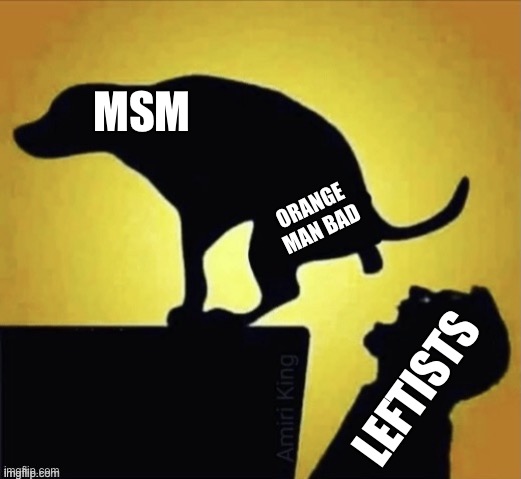Transcript: MAGA Dope Pete Hegseth’s Tantrum Exposes Trump’s Iran Scam
As Pete Hegseth and other loyalists rage at tough reporting on Trump’s Iran bombing, a veteran national security lawyer separates truth from lies and warns that MAGA’s propaganda on this will get worse.
Greg Sargent: This is
The Daily Blast from
The New Republic, produced and presented by the DSR network. I’m your host, Greg Sargent.
President Donald Trump and his top advisers have worked themselves up into a pathological fury about the
leaked intelligence assessment that casts doubt on the success of Trump’s bombing of Iran, a story that has consumed Washington. Defense Secretary Pete Hegseth
ranted wildly about it during a press conference with Trump at the NATO summit, and White House press secretary Karoline Leavitt went full North Korea in praise of Trump with one of her most absurdly obsequious performances yet. Both of them went full throttle in attacking intelligence officials for leaking the assessment. All of which raises a question: Will this administration ever officially tell the truth about the Iran mission, given that everything always must serve the cult of Trump above all else? Today we’re trying to unravel all this with someone who lives deep in the bowels of the deep state and can explain it really well: veteran national security lawyer Bradley Moss. Thanks for coming on, Brad.
Bradley Moss: Absolutely. Anytime, Greg.
Sargent: So
The New York Times, CNN, and others have all reported that this report is from the Defense Intelligence Agency. It’s classified, and it found that after all that bombing, Iran’s nuclear program has only been delayed a few months. It also said much of Iran’s enriched uranium was moved to secret locations. Brad, briefly, what is the DIA, and why is a report like this from the DIA so important, and what should we think about it?
Moss: Sure. The DIA, or the Defense Intelligence Agency, is basically the military’s version of the CIA. It’s the redheaded stepchild. It has fewer resources than CIA. It’s less glamorous in its mission operations than CIA. But it serves that role for the Defense Department, in a manner distinct from what CIA does. And the role they particularly had here was to compile this initial assessment. And let’s be very clear: This is just the initial assessment. It’s still classified, top secret, which means the unauthorized release of it could cause exceptionally grave damage to national security. It’s still official government assessment. It’s still something that the DIA would present to policymakers, both within DOD, such as Secretary Hegseth, as well as all the way up to the president himself to consider when assessing next steps and how to decide where they want to go from a policy standpoint. That’s the nature. That’s the basis of intelligence assessment. You get your initial information, and then you continue to update it as you go along.
Sargent: Just want to be clear though, even if it is initial, this is a really serious document, right? Like, these guys are the real deal.
Moss: It’s a very serious document and it’s supposed to be strictly based on the facts of what they have at the moment. So with an initial assessment like this—something they’re rating [or] what is called “low confidence”—it means they’re just going off the basics of what they can easily get. Satellite imagery, anything they’ve caught on intercepts, chatter along those lines. It’s not going to be into the ground, into the literal mud and into the literal dirt of the explosions yet. They don’t have that information yet. It may take a while for them to truly find out how much damage was caused at that level. But this information is absolutely the type of initial assessment that the government would rely upon. Let’s say if they decided they need to do a second round of strikes. You’d be relying on something like this to inform the policymakers and ultimately informing the president of, Do you need to authorize a second strike, a third strike? You’re not going to have that detailed assessment yet. That takes weeks.
Sargent: Right. And that’s exactly why
The New York Times and CNN … by the way, their national security reporters have been on this story. That’s why those reporters who are also pros are taking this so seriously. It’s really a document that’s meant to inform the way policy thinkers think right now. The only fucking thing that Trump and his top officials can take from it is, How does it reflect on Trump?
Moss: Presidents since the dawn of the modern American military and modern defense apparatus have relied upon initial assessments like this. They’ve put out information to the media. The media has scrutinized and gone to see if there was more detail to it since the dawn of that era going back to World War I and World War II. And we’ve been able to do it without this insanity and the overblown exaggerations you see with Donald Trump. But with him, everything has to be amazing. It has to be the biggest explosion you’ve ever seen. It has to be the most amazing head-turning destruction you’ve ever seen. People have to be lining up to tell him with tears in their eyes that it was so amazing [and] they’ve never seen anybody do anything like it before.
Part of that is because it comes from his life as a salesman. That’s what he does. But the bigger concern is the fact that he can’t level with the American people one way or the other on what came of this. Maybe it was. Let’s be fair. Maybe it was what he says it was. It was this massive success in that regard, and it completely decimated the Iranian nuclear system and apparatus for years to come. That may be the case, but wait till you have the information. Other presidents could have been able to do it, be able to do it just fine like grown men and one day women. He can’t do it because he’s just an insolent little boy.
Sargent: Absolutely. And his own advisers, the tone that they’re setting is taken straight from the top. We had Defense Secretary Pete Hegseth unleash this disgusting rant blaming the media for reporting on this assessment at all and blaming people in the intelligence agencies for leaking it. Listen to this.
Pete Hegseth (audio voiceover): There’s a reason the president calls out fake news for what it is. These pilots, these refuelers, these fighters, these air defenders—the skill and the courage it took to go into enemy territory flying 36 hours on behalf of the American people and the world to take out a nuclear program is beyond what anyone in this audience can fathom. And then the instinct … the instinct of CNN, the instinct of The New York Times
is to try to find a way to spin it for their own political reasons, to try to hurt President Trump or our country. They don’t care what the troops think. They don’t care what the world thinks. They want to spin it to try to make him look bad based on a leak. Of course, we’ve all seen plenty of leakers, and what do leakers do? They have agendas.
Sargent: The way Hegseth uses the troops to disparage basic truth seeking by the free press is just despicable. And the idea that he cares about how this reflects on the troops when all he really gives a shit about is how it makes Trump appear is just laughable. That little show was for Trump, who was standing right next to him, and only for Trump. But Brad, you’re a deep-state denizen. What would actually be behind a leak like this? Would it really be about hurting Trump, which again is the only thing they care about? Or would it be more about trying to get the truth out there? What do you think went into this leak?
Moss: So my general premise and default approach in situations like this is to assume it’s a little bit of both. The person who leaked it probably—you can presume, at least for the moment—is at least not a huge fan of the president. And you can also believe at the same time that part of their motive was they felt that the public was being lied to and there needed to be greater transparency on that. Potentially they would void worse policy decisions coming forward, especially as Congress was evaluating what steps it may or may not take in reliance on its own Article 1 powers. So you can assume that the person is probably low- to mid-level ranking; I don’t think this came from a senior official. You can assume that the person has considerable expertise and experience in this field; knows what the information actually showed and what it doesn’t show, particularly with respect to what Trump said, and just couldn’t stand to hear this anymore.
Whether or not that person will ultimately be caught and be punished, it’s entirely possible. Look no further than Reality Winner and what she did during the first Trump administration. She paid for her leak of a single document—which she had done for purposes of transparency, but she also was not a political fan of the president. But she did it for purposes of transparency. She went to jail. That’s the reality of what could possibly happen here. I certainly get, from a national security standpoint, the president, the secretary of defense denouncing the leak in general. Any president is going to do that. Any secretary of defense is going to do that.





